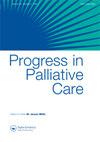Do not resuscitate orders in the time of COVID-19: Exploring media representations and implications for public and professional understandings
IF 0.9
Q4 PUBLIC, ENVIRONMENTAL & OCCUPATIONAL HEALTH
引用次数: 0
Abstract
Context: During the COVID-19 pandemic, the UK press featured headlines that heightened concerns around Do Not Attempt Cardiopulmonary Resuscitation (DNACPR) orders, particularly the use of ‘blanket’ DNACPR orders applied to older people in care settings. The portrayal of DNACPR may impact professional and public understandings with implications for end-of-life care. Objectives: To explore the portrayal of DNACPR orders in the general and academic press and consider implications for public and professional understandings and practice. Method: Academic papers and articles published in the general press during the first wave of the COVID-19 pandemic in the UK were retrieved. Those pertaining to the use of DNACPR orders were analysed thematically. Results: Analysis of 179 media articles and 11 professional commentaries identified mixed understandings of DNACPR as indicated within three themes: rationing of acute services, championing autonomy in DNACPR decisions, and communication and trust. The call to ‘protect the NHS’ marginalised palliative and social care services with DNACPR constructed as a rationing tool. This led to ethical challenges around autonomy, DNACPR decisions, communication and trust. Conclusions: Media coverage of DNACPR orders was contentious and raised questions around the value of life and quality of dying, particularly for vulnerable individuals. DNACPR orders were conflated with frailty, futility and rationing of acute services and the marginalisation of palliative care. Nevertheless, media outputs stimulated advocacy and support for human rights and autonomy. However, it is unclear what the legacy will be for public and professional understandings of advance care planning and the quality of dying.新冠肺炎期间不要恢复秩序:探索媒体的表现和对公众和专业理解的影响
背景:在新冠肺炎大流行期间,英国媒体报道了一些头条新闻,这些头条新闻加剧了人们对“请勿尝试心肺复苏”(DNACPR)命令的担忧,特别是对护理环境中适用于老年人的“一揽子”DNACPR命令的使用。DNACPR的描述可能会影响专业人士和公众对临终关怀的理解。目的:探讨DNACPR命令在普通媒体和学术媒体上的描述,并考虑对公众和专业人士理解和实践的影响。方法:检索在英国第一波新冠肺炎大流行期间在普通媒体上发表的学术论文和文章。对那些与DNACPR命令的使用有关的内容进行了主题分析。结果:对179篇媒体文章和11篇专业评论的分析发现,对DNACPR的理解存在三个主题:急性服务的配给、支持DNACPR决策的自主权以及沟通和信任。“保护NHS”的呼吁将DNACPR作为配给工具,将姑息治疗和社会护理服务边缘化。这导致了自主性、DNACPR决策、沟通和信任方面的道德挑战。结论:媒体对DNACPR命令的报道存在争议,并引发了人们对生命价值和死亡质量的质疑,尤其是对弱势群体。DNACPR命令与脆弱、徒劳和急性服务配给以及姑息治疗的边缘化混为一谈。尽管如此,媒体的产出促进了对人权和自治的宣传和支持。然而,目前尚不清楚公众和专业人士对预先护理计划和死亡质量的理解会留下什么样的遗产。
本文章由计算机程序翻译,如有差异,请以英文原文为准。
求助全文
约1分钟内获得全文
求助全文
来源期刊

PROGRESS IN PALLIATIVE CARE
PUBLIC, ENVIRONMENTAL & OCCUPATIONAL HEALTH-
CiteScore
2.60
自引率
11.80%
发文量
24
期刊介绍:
Progress in Palliative Care is a peer reviewed, multidisciplinary journal with an international perspective. It provides a central point of reference for all members of the palliative care community: medical consultants, nurses, hospital support teams, home care teams, hospice directors and administrators, pain centre staff, social workers, chaplains, counsellors, information staff, paramedical staff and self-help groups. The emphasis of the journal is on the rapid exchange of information amongst those working in palliative care. Progress in Palliative Care embraces all aspects of the management of the problems of end-stage disease.
 求助内容:
求助内容: 应助结果提醒方式:
应助结果提醒方式:


